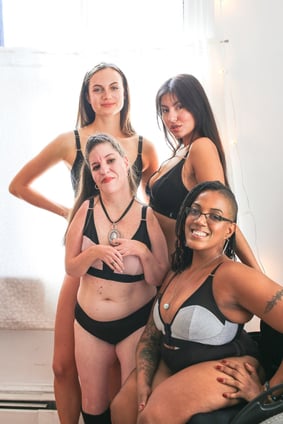Desirability as a Disabled Woman: Leveraging Adaptive Lingerie
By Emma Butler
For many women, shopping for intimates and lingerie is an act of self-love. It’s an experience that helps define our sense of femininity, personal identity, and self-assurance. Who doesn’t feel absolutely fabulous wearing their favorite set of lacy underwear? Every woman deserves that boost of confidence. So, while I love the push towards more size-inclusive lingerie with companies such as CUUP or ThirdLove, there are hardly any brands creating adaptive intimates.
Most disabled folks are all too familiar with the struggle of finding adaptive outerwear that is both fashionable and functional, and this becomes even more difficult when it comes to finding adaptive lingerie.
My name is Emma Butler, and I was first introduced to adaptive fashion when I was 10-years-old. My mother, a self-proclaimed fashionista, was diagnosed with a few chronic illnesses that left her disabled. Together we tried to find fashionable and functional clothing for her limited mobility, but when we googled “adaptive underwear,” most products we found were plain, ugly, medicinal, and marketed towards the elderly. My mom described her shopping experience as dehumanizing.
When I entered college, I met many women with similar and different disabilities from my mom. They all shared the sentiment that bras and underwear can be a nightmare to put on yet are such a staple aspect to everyday dressing. Annoying hooks and eyes, buttons, zippers, clasps that require sharp hand dexterity, and clothes that don’t fall well on bodies that are in a seated position all day make getting dressed incredibly difficult. This inspired me to found my own lingerie brand, Intimately. Intimately aims to be the one-stop-shop for adaptive and fashionable intimates. Our mission is to empower disabled women to feel emboldened and desirable through lingerie designed to be easy to put on for all folks with all types of mobility. It’s also a place where women with disabilities can connect and share their thoughts on everything: from love and sex to lifehacks travel, fashion and beauty.
Our clothing and especially our intimates play such a huge role in our self-confidence and desirability. That is exactly why we created a community section for Intimately. We have a lot of barriers to break down, a lot of misconceptions about disabilities and sex to educate each other and our abled-bodied allies, friends, and partners about, and this is just the beginning.
Looking through my social media feed or scanning the latest fashion news today, I am excited to see the conversation shift towards how brands advocate for disability rights and equity. But the lingerie industry is behind mainstream outerwear brands like Tommy Hilfiger or Target to become more disability-inclusive despite the same demand for these products. This bolsters my belief that we need more adaptive, sexy intimate lines in the mainstream to challenge the stereotype that people with disabilities don’t have sex.
All of us are beautiful, and a little boost from easy to put on and accessible lingerie can make all the difference.
Author bio:
Emma Butler is the founder and CEO of Intimately, an inclusive lingerie brand that aims to empower disabled women through fashionable and adaptive undergarments. She is a ’20 Brown University graduate and currently a candidate for her MBA at Duke. Any given day, you can find her drawing and painting, learning how to cook something other than her famous mac & cheese, or reading a mystery novel. Instagram: @emma_cbutler. Website: https://www.intimately.co/
Join Our Movement
What started as an idea has become a national movement. With your support, we can influence policy and inspire lasting change.
Become an Advocate